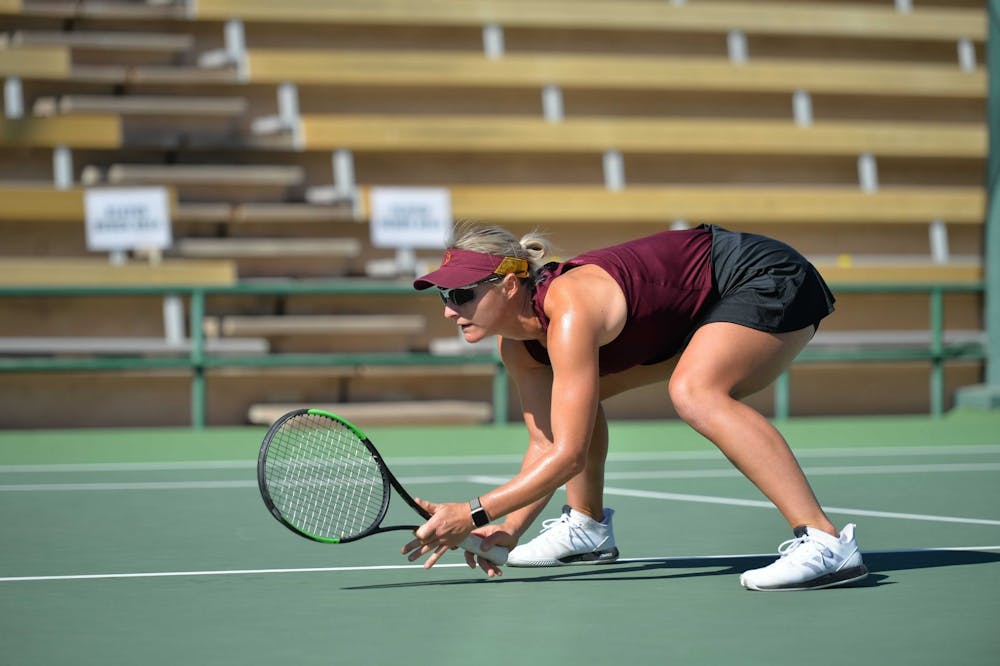At 13 years old, ASU women's tennis senior Ilze Hattingh said goodbye to her parents and everything she knew to move from Durban, South Africa, to Pretoria, South Africa, to train at one of the best tennis academies in the country.
The experience she gained there, along with the hardships she overcame, pushed her to become one of ASU's and collegiate tennis' best players.
After playing a multitude of sports growing up, including javelin throwing, shot put and field hockey, Hattingh decided to pursue tennis full time in seventh grade and moved to live with a teacher in Pretoria, something she thought was "very scary" and "lonely."
"I was so used to having friends and things to do, but that all stopped when I moved to Pretoria," Hattingh said. "I had to start homeschooling because I wasn't staying in one place for more than three weeks at a time."
Hattingh trained under former professional South African tennis player John-Laffnie de Jager at JL's Tennis Academy, traveling across the globe representing South Africa. She saw success while playing professionally, including winning a tournament in 2014 and reaching the finals of another in 2015.
However, about a year into Hattingh's time in Pretoria, she began feeling "itching" underneath her rib cage and feet upon returning to South Africa from a tournament in Botswana. Hattingh said her parents thought the itching was caused by bedbugs from a bed-and-breakfast she stayed at, so she continued to play.
Hattingh played through a tournament only to have her father discover a troubling sign shortly after she finished: Her eyes were yellow.
"We didn't even get to go home, my father rushed me straight to the hospital, and the doctor was panicking and didn't know what was wrong with me," Hattingh said.
After drawing blood, Hattingh was diagnosed with hepatitis and was immediately admitted to the hospital. She was released from the hospital after spending a few days connected to an IV drip.
After recovering from hepatitis, Hattingh continued to travel the world playing tennis for the next three years. However, Hattingh grew "truly unhappy" with tennis and was ready to quit the sport. Hattingh said coaches told her to take two months off, but she kept playing.
"I didn't know anything else," she said.
Hattingh broke down after a first-round loss in a tournament in Egypt, something that wasn't familiar for her. She said there were "such high expectations" for her being one of the top seeds in the tournament.
"I went behind a little bush, called my dad and cried because I was so lonely and so unhappy with my life," Hattingh said.
ASU associate head coach Matt Langley began recruiting Hattingh in 2014, before he came to ASU, but she was hesitant at first to leave to play college tennis. However, Hattingh's initial resistance didn't stop Langley from recruiting her.
"Over time, I kept following Ilze's results even after she denied me," Langley said.
After months of not being happy playing in South Africa, Hattingh reached out to Langley on Facebook in 2016 and asked if the roster spot was still available for her.
Langley immediately began preparing paperwork to bring Hattingh to the U.S. However, one thing was missing: an SAT score, which was required by the NCAA for her to come onto the roster, Langley said.
"I had barely ever heard of all of the paperwork, let alone the SAT," Hattingh said.
She eventually took the SAT but didn't hear from Langley for weeks, coming to the conclusion the NCAA rejected her paperwork due to her past professional experience. She began planning to play in more professional tournaments thinking her dreams of coming to Arizona to play collegiate tennis were shattered.
A month later, Langley called. "You got in, do you still want to come?" he asked.
In January 2017, Hattingh arrived at ASU and has not looked back since.
"It's been such an amazing journey, and I'm so grateful that I have been able to get my extra years of eligibility," Hattingh said. "I wouldn't change it, even with the lowest lows in my life. It brought me to where I am right now."
Hattingh won the Pac-12 Doubles Team of the Year honors in her junior year with her partner at the time, senior Lauryn John-Baptiste. She ended the following season ranked No. 40 in singles and No. 46 in doubles with senior Tereza Kolarova.
"She has won some and lost some over her career," head coach Sheila McInerney said. "Ilze works really hard every day and deserves everything she has earned."
In her last season of eligibility, she hopes the team can qualify for the NCAA Championships and make it past the second round, which according to Hattingh, would be a first for ASU women's tennis.
"My career has been an absolute rollercoaster, but I hope that my teammates and people who watch me see me as a hard-working person who never gave up," Hattingh said.
Reach the reporter at lhertz@asu.edu and follow @laurenrachell_ on Twitter.
Like The State Press on Facebook and follow @statepress on Twitter.
Continue supporting student journalism and donate to The State Press today.




